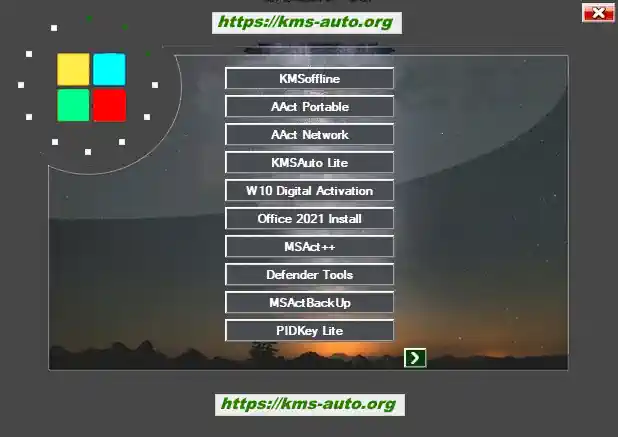In the world of software activation and licensing, KMS Tools, often referred to simply as KMS, is a term that frequently comes up. It’s associated with a set of tools and techniques used to activate and manage Microsoft Windows and Office products. If you’re curious about what KMS Tools are, how they work, and their relevance in the software landscape, this comprehensive guide will provide you with all the information you need to understand KMS Tools.
Understanding KMS Tools
KMS stands for Key Management Service, and KMS Tools refer to a set of software tools and techniques designed to activate Microsoft Windows and Office products without requiring individual product keys for each installation. This method is particularly prevalent in enterprise environments where managing a large number of product keys can be cumbersome. KMS Tools simplify the activation process by centralizing it through a KMS server.
How KMS Tools Work

The core principle behind KMS Tools is the use of a KMS server, which acts as a centralized activation server. Here’s how the process typically works:
- KMS Server Setup: In an enterprise or organization, an administrator sets up a KMS server. This server is responsible for activating Windows and Office installations within the organization.
- Client Configuration: Computers within the organization are configured to connect to the KMS server for activation. This configuration is typically done using a special KMS client key provided by Microsoft.
- Activation Requests: When a computer with the KMS client configuration is installed, it sends activation requests to the KMS server at regular intervals, usually every 180 days.
- Activation Count: The KMS server keeps track of the number of activation requests it receives. Once a certain threshold is reached (usually 25 or more requests), the KMS server activates Windows or Office for all the connected clients.
- Activation Confirmation: Once activated, Windows and Office products on the client computers receive confirmation from the KMS server, and they become fully functional.
- Periodic Reactivation: To maintain activation, client computers continue to communicate with the KMS server periodically. This ensures that activated installations remain valid.
Popular KMS Tools
Several KMS Tools have gained popularity over the years for their ability to activate Microsoft products efficiently. It’s important to note that the use of these tools may not always be legal, and their legitimacy can vary. Here are some well-known KMS Tools:
| KMS Tool | Description |
| KMSpico | KMSpico is one of the most widely known KMS Tools. It is designed to activate Windows and Office products. The tool is often distributed through unofficial channels. |
| KMSAuto | KMSAuto is another popular KMS activation tool that provides activation for various Windows and Office versions. It is available in multiple languages. |
| Microsoft Toolkit | Microsoft Toolkit is a set of tools that can activate, manage, and troubleshoot Microsoft products, including Windows and Office. It offers various activation methods. |
It’s important to exercise caution when using such tools, as they often exist in a legal gray area.
Legal and Ethical Considerations
The use of KMS Tools raises important legal and ethical questions, primarily related to software licensing and compliance. Here are some key considerations:
- Licensing Agreement: When you use Microsoft software, you enter into a licensing agreement that specifies how the software can be used. Activating Windows or Office using KMS Tools may violate the terms of this agreement.
- Software Piracy: The unauthorized activation of Microsoft products through KMS Tools can be considered a form of software piracy. Engaging in software piracy can result in legal consequences.
- Ethical Considerations: Using KMS Tools can be viewed as unethical because it undermines the software developer’s ability to monetize their products and invest in development and support.
- Enterprise Use: While KMS activation is often associated with piracy, it is worth noting that some organizations use KMS legitimately for large-scale software deployment. In these cases, they obtain the necessary licenses and follow Microsoft’s guidelines.
Risks and Consequences
Using KMS Tools, especially from unofficial sources, can expose users to various risks and consequences:
- Legal Consequences: Engaging in software piracy by using KMS Tools can lead to legal action, fines, and penalties.
- Security Risks: KMS Tools from unofficial sources can contain malware or malicious code that compromises the security of your computer.
- Unstable Systems: Improperly activated software can lead to system instability, crashes, and data loss.
- No Access to Updates: Systems activated using KMS Tools may not receive critical security updates and feature enhancements from Microsoft.
- Reactivation Issues: Over time, KMS activations can expire, leading to the need for reactivation. This can be problematic if you no longer have access to the KMS server.
Alternatives to KMS Tools
To ensure legal and ethical software usage while still managing software activations efficiently, consider these alternatives to KMS Tools:
- Purchase Legitimate Licenses: The most straightforward and legal way to activate Microsoft products is by purchasing legitimate licenses. This ensures compliance with licensing agreements and grants access to updates and support.
- Volume Licensing: For organizations, Microsoft offers volume licensing options that simplify software management and activation for multiple users.
- Free Alternatives: Some software applications provide free alternatives to Microsoft Office, such as LibreOffice and OpenOffice, which can be used without the need for activation.
- Open Source Software: Explore open-source software solutions for various needs, from operating systems (e.g., Linux) to productivity software (e.g., G Suite).
Conclusion
KMS Tools, while offering a convenient way to activate Microsoft Windows and Office products, come with significant legal, ethical, and security risks. Engaging in software piracy by using KMS Tools from unofficial sources can lead to severe consequences. It’s essential to prioritize legal and ethical software usage, which includes purchasing legitimate licenses or exploring free and open-source alternatives. Understanding the potential risks and consequences associated with KMS Tools is crucial for making informed decisions about software activation.

